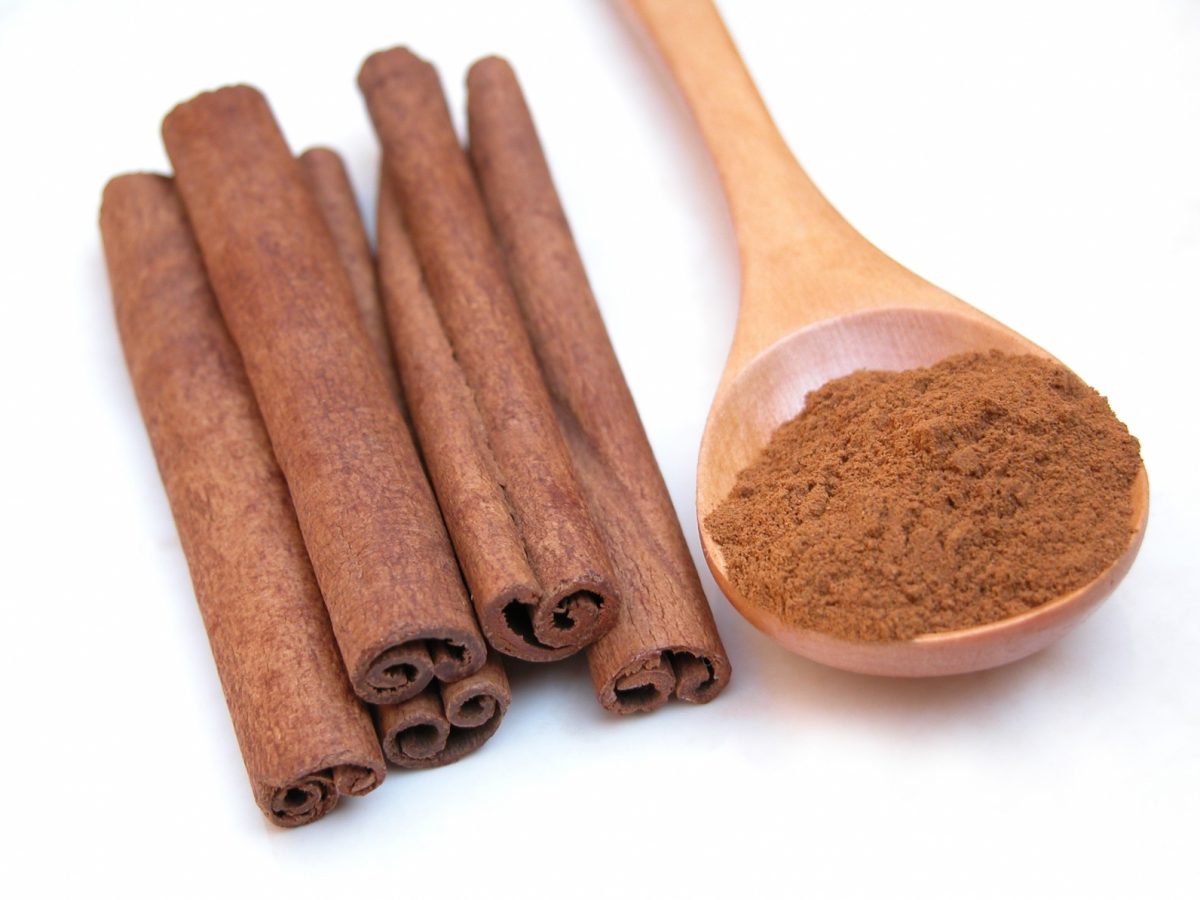Cinnamon has long been enjoyed both as a culinary spice and natural medicine.
It is important to note that that the common type of cinnamon sold in grocery stores is not “true cinnamon” Ceylon cinnamon, which is the cinnamon referred to in most health studies. This is important because the type of cinnamon sold in most grocery stores Cassia cinnamon, could potentially have negative rather than positive effects on your health, if consumed in large amounts. For more information on the differences between Ceylon and Cassia cinnamon see end note.
Health benefits of Cinnamon:
Nutritional:

1. Anti-Clotting: Cinnamaldehyde (a volatile/essential) oil in cinnamon may help stop blood from clotting unnecessarily. According to whfoods.com, cinnamon accomplishes this, “by inhibiting the release of an inflammatory fatty acid called arachidonic acid from platelet membranes and reducing the formation of an inflammatory messaging molecule called thromboxane A2.)”
This same property (inhibiting the release of arachidonic acid) makes cinnamon a natural anti-inflammatory.
2. Anti-Microbial: The essential oils in cinnamon are also “anti-microbial” and have been shown to stop many types of fungal and bacterial growth.
“Cinnamon’s antimicrobial properties are so effective that recent research demonstrates this spice can be used as an alternative to traditional food preservatives.” – whfoods.com
3. Blood Sugar Control: Cinnamon is a powerful antioxidant and also may help to control blood sugar on many levels, which helps
- slow the rate at which the stomach empties after meals.
- improve insulin response in people with Type 2 Diabetes.
As little as one gram of cinnamon a day has been shown to reduce blood sugar levels, triglycerides, LDL cholesterol, and total cholesterol, in individuals with diabetes. According to whfoods.com, cinnamon will help reduce the risk of cardiovascular disease in people with type 2 disease.
4. Boosts Brain Function: Smelling the scent of cinnamon can boost brain activity.
In research reported by whfoods.com, cinnamon “enhanced study participants’ cognitive processing,” with the following activities:
– Tasks related to attentional processes
– Virtual recognition memory
– Working memory
– Visual-motor speed while working on a computer-based program
5. Improved colon health and protection against heart disease:
Cinnamon is an excellent source of fiber, calcium and certain minerals, such as manganese.
Calcium and fiber combine to help remove bile salts from the body, which helps to protect the colon and reduce the risk of colon cancer.
Through this process, cholesterol levels may be lowered, helping prevent atherosclerosis and heart disease.
The fiber in cinnamon may also provide relief from constipation or diarrhea.
6. Warming Effects:
Cinnamon has been used in Traditional Chinese Medicine, for its warming properties, such as during a cold or flu.
Differences between Ceylon cinnamon and Cassia Cinnamon:
“The two major types of cinnamon used in food preparation are Ceylon cinnamon and Cassia cinnamon. Ceylon cinnamon (Cinnamomum verum or Cinnamomum zeylanicum), native to Sri Lanka, is also known as “true cinnamon.” This is NOT the predominant spice typically sold as cinnamon in the United States. What is commonly found at your grocer is a closely related and less expensive variety called Cassia cinnamon. Cassia is native to Burma and also grown in China and Vietnam. Cassia is slightly darker in color compared to Ceylon, and has a stronger, more pungent flavor. While both Cassia and Ceylon are derived from the inner bark of Cinnamomum trees, Ceylon cinnamon is preferable. Ceylon cinnamon is considered a finer quality spice due to its sweeter, more delicate and complex flavor.
In addition to flavor, a critical difference between Ceylon and Cassia is the coumarin content of Cassia. Cassia cinnamon is the main source of coumarin in the human diet. Coumarin is a naturally occurring toxin which has the potential to damage the liver in high doses. Cassia contains high levels of coumarin, whereas Ceylon contains either undetectable levels or only traces of coumarin….
Recent studies have revealed that regularly consuming Cassia cinnamon powder could be problematic, resulting in potentially harmful levels of coumarin intake. For example, one study estimated that small children eating oatmeal sprinkled with cinnamon a few times a week would exceed the established safe upper limit of exposure. Similarly, they concluded that adults who are heavy consumers of culinary cinnamon or take powdered cinnamon supplements could also reach potentially unsafe doses.”
(via Care2)







